

Environmental Trends for 2018 - What's coming up? We reached out to our followers on social media as well as our ECO Research Community to learn about their predictions for environmental trends in 2018.
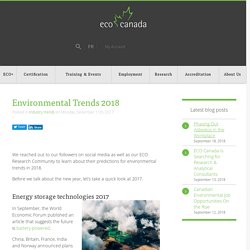
Before we talk about the new year, let’s take a quick look at 2017. Energy storage technologies 2017 In September, the World Economic Forum published an article that suggests the future is battery-powered. China, Britain, France, India and Norway announced plans to move away from diesel cars and start focusing on producing electric vehicles. At the same time, growth of solar and other renewables will need effective energy storage technologies; therefore, predictions indicate that lithium-ion battery production will go from 30 GWh per year to 200 GWh in the next few years. These batteries are used in medical devices, cell phones, computers, drones as well as hybrid and electric cars.
12 Emerging Global Trends That Bring Hope for 2018. Five key sustainability trends for 2018. Foresight emerging trends 2017 au. Global risks in the face of social, environmental and technological change. Global risks related to key social, environmental and technological trends are creating an interconnected web that continues to sow considerable uncertainty for humanity going forward.
Some relevant insight to be taken from narrative on 'connected risks' The first of the major trends relates to key social themes, from rising income inequality to increased polarisation on political and ideological lines, with key conditions, such as structural unemployment, underemployment and profound social unrest part of the wider web of interconnected risks. The second major trend to arise from the study is the changing climate, and its potential effects on global stability. The failure of climate change mitigation and adapation has a knock-on impact on wider environmental systems, which in turn affect global stability. Protecting environmental stability, upon which social institutions and biodiversity depend, therefore remains a key theme for humanity going forward. The third major theme noted by the research is that technology is advancing considerably faster than society is able to transform. Key questions remain about the inherent value of technology itself, whether it is a panacea for market failures or itself an expression of such failures, and the consequences of unabated and market driven technological development. Some of the technologies being developed have considerable risks, from social instability to opening Pandora's box. Progression, does not inherently mean, we progress. “We live in disruptive times where technological progress also creates challenges. Without proper governance and re-skilling of workers, technology will eliminate jobs faster than it creates them. Governments can no longer provide historical levels of social protection and an anti-establishment narrative has gained traction, with new political leaders blaming globalization for society’s challenges, creating a vicious cycle in which lower economic growth will only amplify inequality. Cooperation is essential to avoid the further deterioration of government finances and the exacerbation of social unrest,” reflects Cecilia Reyes, Chief Risk Officer of Zurich Insurance Group. – k.garnettcranfield.ac.uk
Migration, climate change and weapons of mass destruction are expected to leave the riskiest mark on governments and businesses globally. The world faces considerable uncertainties in the face of rapidly developing technologies, increasing income inequality, social polarisation and environmental degradation. In a new report from the World Economic Forum, in strategic partnership with Marsh & McLennan Companies and the Zurich Insurance Group, the current largest scale risks facing the world are explored.
The 12th edition of the ‘Global Risk Report’ involved 745 ‘world leaders’ from, among others, business, academia, and NGOs. 7 key trends all sustainability execs should watch. It is 2018, and it arguably never has been a more difficult, unpredictable, yet exciting time to run an international business. No doubt overcoming the Great Depression ahead of the outbreak of World War II in the 1930s was more than a little trying, of course. But fast forward 80 to 90 years and the global economy is an ever more complex and fast-evolving place, exposed to a widening variety of risks and shocks — a fact only underlined by last week's stock market volatility.
Preparing the Commission for future opportunities - Foresight network fiches 2030. What will the future bring when it comes to digital technologies, for example in the field of health and wellbeing?
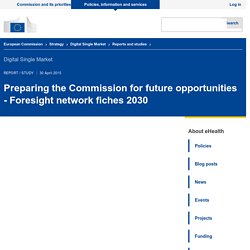
This new report tells us what to expect for 2030. According to the report written by experts of the European Commission, digital technologies are on the move. They are not anymore just 'trendy technologies' available for information and communications, but they are for example dramatically changing the very criteria for market access for almost all kinds of products, services, and ideas. Concerning our health, science and technological progress has contributed vastly to the increase of our life expectancy. Untitled. EU Sustainable Energy Week: LPG can help Lead Europe’s clean energy transition. Electricity is the new oil: Digitalisation and the world’s energy system. Electric Cars Pave the Way for Green Tech. There are growing calls for ethically sourced rare minerals and a rising demand for low-carbon metals — even at a higher price point.
Electric car market is expected to surge in coming years (nothing new here), with in comes a demand for raw materials like copper, aluminium and cobalt. This article suggests there is a growing demand for resource acquisition that takes the environment into account. – amcep
When it comes to the fight against climate change, the conversation has focused nearly exclusively on how to bring down levels of one element — carbon.

But what role will the metals and the mining industry play in the drive to realize a low-carbon future? As it turns out, one larger than we might think. At the end of November, 10 leading auto and truck manufacturers including Toyota, Honda and Volkswagen, announced a new initiative to respect environmental and ethical standards in sourcing raw metals and minerals for electric vehicle (EV) production. In the coming years, the electric car market is expected to surge as regulators enact strict emissions limits and incentivize EV production. 10 tech trends that will impact social justice in 2018 / Ford Foundation. Ford Foundation is helping develop a path for people to use their technology skills for the public good.
Learn more about Public Interest Tech. The resilience and fragility of 2017 has been met with increased instability, polarization, and crackdowns on democratic principles in 2018. Still, activists around the world continue to push for the protection and expansion of human and civil rights. At the same time, technology continues to both support and undermine social justice, adding a layer of complexity for the field. Exploring environmental and technological effects on culture evolution at different spatial scales. Many famous ancient civilizations such as ancient Egypt, Mesopotamia, Maya, Angkor, and the Han and Tang Dynasties in ancient China have emerged and flourished around the world.
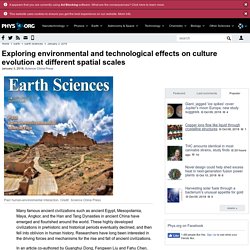
These highly developed civilizations in prehistoric and historical periods eventually declined, and then fell into oblivion in human history. Researchers have long been interested in the driving forces and mechanisms for the rise and fall of ancient civilizations. There is an ongoing debate about the leading factors for ancient culture evolution. Let’s make technology the solution to poverty and gender inequality. The Fourth Industrial Revolution (4IR) is upon us.
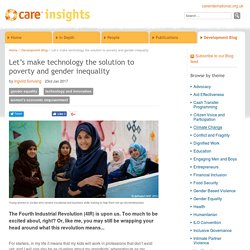
Too much to be excited about, right? Or, like me, you may still be wrapping your head around what this revolution means... For starters, in my life it means that my kids will work in professions that don’t exist yet; and I will one day be as clueless about my grandkids’ whereabouts as my Norwegian fisher-farmer grandmother was about my adventures. Is technology contributing to increased inequality?
As global poverty continues to decline, another issue emerges.
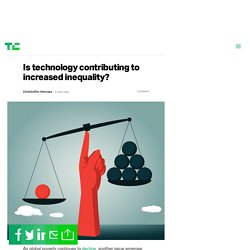
According to the World Economic Forum, rising income inequality and the polarization of societies pose a risk to the global economy, and may lead to increased polarization and lack of political stability. This, however, is not a global problem. In developing countries, inequality is decreasing and the amount of people living in extreme poverty is at an all-time low. Mobile technology is contributing to financial inclusion in countries without an established financial infrastructure, and global markets create trade opportunities. 10 tech issues that will impact social justice in 2017 / Ford Foundation.
In our increasingly complex and interconnected world, innovations in technology and data are inching us closer to a reality driven by automation, prediction, personalization, surveillance, and the merging of our physical and digital lives.
Implication for the environment will need to be inferred – k.garnettcranfield.ac.uk
This is taking place at the same time that the world is experiencing transformative cultural, demographic, economic, and political shifts. In the face of so much uncertainty and change, the independent watchdog group Freedom House reports that globally, Internet freedom has declined for the sixth consecutive year, “with more governments than ever before targeting social media and communication apps as a means of halting the rapid dissemination of information, particularly during anti-government protests.”
At the same time, Civicus has highlighted the many threats facing democracies, representative institutions, and civil society as a whole. Earth 2050. 2018 Social Impact and Technology Predictions. Each year Nesta - a leading innovation think and do-tank - releases their 10 predictions for what to expect by way of innovation the coming year.
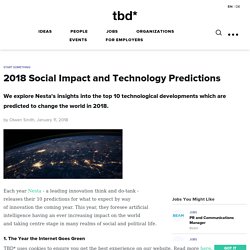
This year, they foresee artificial intelligence having an ever increasing impact on the world and taking centre stage in many realms of social and political life. 1. EPRS STU(2018)614539 EN. Employment and Social Developments in Europe: 2018 review confirms positive trends but highlights the increasing need for skills and inclusion - Employment, Social Affairs & Inclusion. Today, the Commission has published the 2018 edition of its yearly Employment and Social Developments in Europe (ESDE) review.
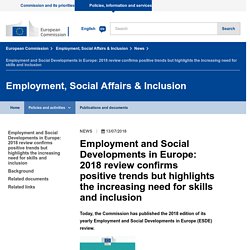
This year’s edition confirms the ongoing positive labour market trends as well as an improving social situation. The numbers of people in employment reached new record levels. With almost 238 million people having a job, employment has never been higher in the EU. Technology, globalisation and the future of work in Europe: Essays on employment in a digitised economy. The industrial structure of European economies and the types of occupation that they support are changing.
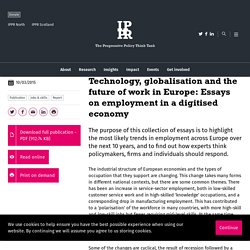
This change takes many forms in different national contexts, but there are some common themes. There has been an increase in service-sector employment, both in low-skilled customer service work and in high-skilled 'knowledge' occupations, and a corresponding drop in manufacturing employment. Future - How climate change will transform business and the workforce. When we think of climate change, most of us think of environmental consequences like rising sea levels, elevated temperatures and melting glaciers.
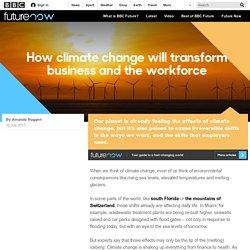
In some parts of the world, like south Florida or the mountains of Switzerland, those shifts already are affecting daily life. In Miami, for example, wastewater treatment plants are being re-built higher, seawalls raised and car parks designed with flood gates – not only in response to flooding today, but with an eye to the sea levels of tomorrow. But experts say that those effects may only be the tip of the (melting) iceberg. Climate change is shaking up everything from finance to health. As a result, it isn’t only urban planners in at-risk areas who will have to shift their framework for planning for the future. Smart cities have the ability. With the amount of data available today, cities are constantly innovating, finding new ways to apply insights in ways that benefit citizens. This is no small task, as new technologies are constantly reshaping what’s possible when it comes to using and making sense of data.
Data creates opportunities. Cities are rife with challenges that not only impact their own residents but society at large. Smart Cities: An Answer to Social and Environment Risks? This Golden Canopy Could Power 500 Homes. ‘Smart villages’ are modernisation tools to be taken seriously. Owning a car will soon be a thing of the past. EU farmers ‘hostages’ of unstable politics and technology gap, report claims.
The lack of access to modern technologies combined with the fragile political landscape has put agriculture production in the EU under enormous pressure, at a time when other major farm markets in the world are growing, a new report has found. Large-scale US wind power would cause warming that would take roughly a century to offset. All large-scale energy systems have environmental impacts, and the ability to compare the impacts of renewable energy sources is an important step in planning a future without coal or gas power. Extracting energy from the wind causes climatic impacts that are small compared to current projections of 21st century warming, but large compared to the effect of reducing US electricity emissions to zero with solar.
Research publishing in the journal Joule on October 4 reports the most accurate modelling yet of how increasing wind power would affect climate, finding that large-scale wind power generation would warm the Continental United States 0.24 degrees Celsius because wind turbines redistribute heat in the atmosphere. "Wind beats coal by any environmental measure, but that doesn't mean that its impacts are negligible," says senior author David Keith, an engineering and public policy professor at Harvard University. Their analysis focused on the comparison of climate impacts and benefits. In hot water: How summer heat has hit Nordic nuclear plants. Bill Gates and Richard Branson bet on lab-grown meat startup. Duck à l’Orange made by Memphis Meats Photo courtesy Memphis Meats Vegetarians have long touted the ethical and environmental problems with meat production and consumption. 100% biodegradable packaging company expands.
First commercial flight partly fuelled by recycled waste lands in UK. The first commercial flight to use jet fuel partly made from recycled industrial waste has landed at Gatwick. The Virgin Atlantic plane, travelling from Orlando to London, was powered by a new blend of normal jet fuel and ethanol produced from waste gases, which the airline says could significantly lower aviation’s carbon footprint. The flight’s fuel blend was 5% recycled, but the sustainable element could eventually form up to 50%. It was produced in the US by LanzaTech, which claims it could eventually supply about 20% of the aviation industry’s fuel, and cut greenhouse gas emissions by 65% compared with conventional petroleum.
Next-generation optimisation of forest data for better forest management. New home energy storage system to connect batteries to solar panels. Techno-Optimism and Farmers’ Attitudes Toward Climate Change Adaptation – Environmental News Bits. Controversial nuclear power plants in Europe - Power Technology. Paris as a Green and Sustainable Future City Is Even More Beautiful. Future of cooling.
Demand for cooling appliances is increasing, particularly air conditioning. This comes from the rise in temperatures as well as rising incomes. – amcep
Where are the e tools to modernise the CAP. War on plastic may do more harm than good, warns think tank. Averting the Climate Change Hunger Games. Will AC Put a Chill on the Global Energy Supply?